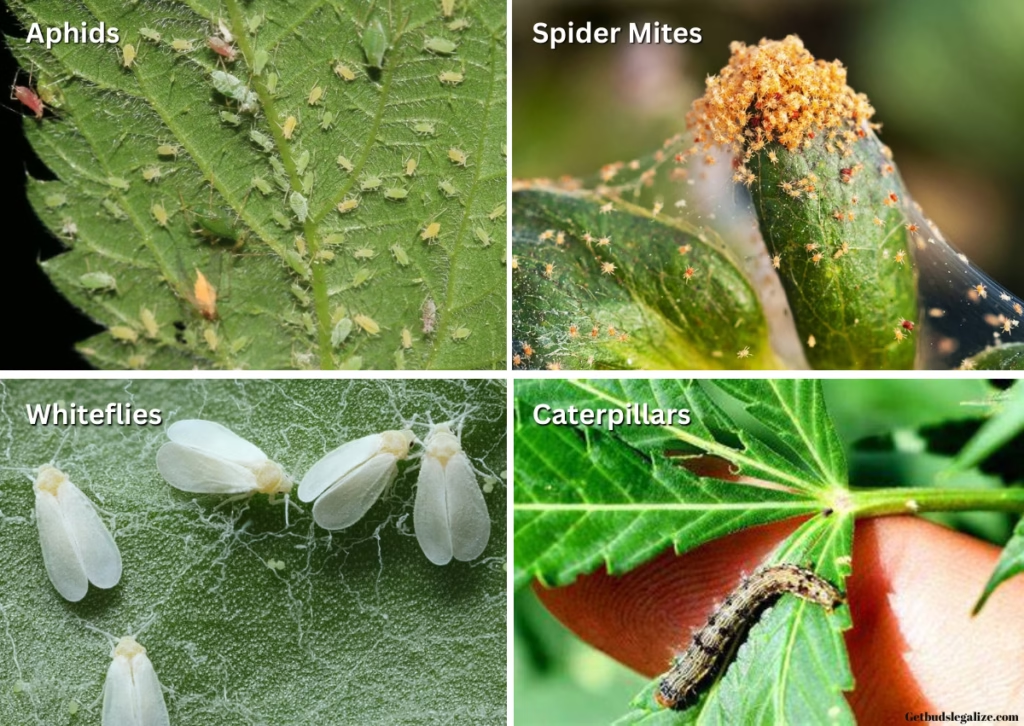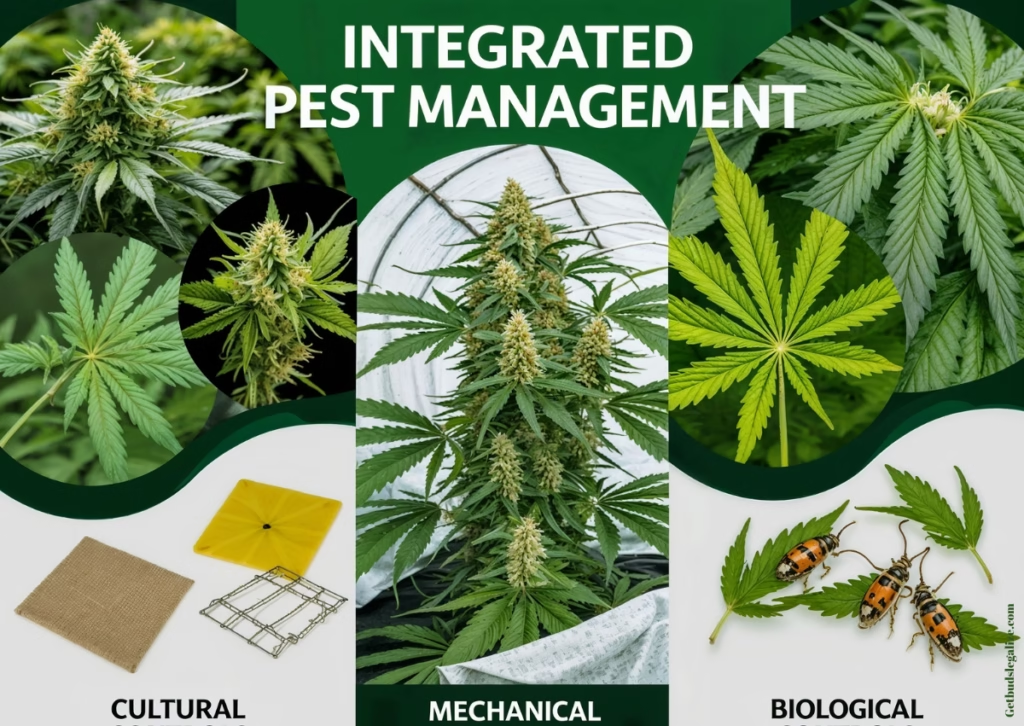Effective Organic Pest Control for Cannabis Plants: Natural Solutions for a Healthier Harvest



Effective Organic Pest Control for Cannabis Plants: Natural Solutions for a Healthier Harvest
Cannabis cultivation comes with its fair share of challenges, and pest control is at the top of the list. These tiny invaders can devastate your plants, reducing both the quality and quantity of your harvest. While chemical pesticides are an option, more cannabis growers are turning to organic solutions to maintain a healthier, eco-friendly garden.
In this guide, we’ll explore a variety of natural, organic pest control strategies that will help keep your cannabis plants healthy and thriving, all while protecting the environment.
Why Choose Organic Pest Control for Your Plants?
Organic pest control offers several benefits over chemical alternatives, making it the preferred choice for many cannabis cultivators. Here’s why you should consider organic solutions for pest management:
- Healthier Plants: Organic methods promote biodiversity, strengthen your plants' natural defenses, and enhance plant health.- Safer for Consumers: Organic cannabis is free from harmful chemical residues, ensuring safer consumption.
- Eco-Friendly: Organic solutions protect the surrounding ecosystem, preserving soil and water quality.
- Sustainable Long-Term Solutions: Organic pest control often focuses on prevention, reducing the need for reactive treatments.
Common Cannabis Pests and How to Identify Them

Early pest identification is key to effective control. Here are some common pests that may invade your cannabis garden:
- Aphids: These small, pear-shaped insects, often green, black, or yellow, suck sap from your plants. Their feeding weakens the plant, causing yellowing, distorted, and curling leaves. They also excrete sticky honeydew, which can lead to sooty mold growth.- Spider Mites: Tiny red or yellow mites that are hard to spot without magnification. They feed on plant cells, leaving leaves speckled with white or yellow spots. Severe infestations result in leaf discoloration, drying, and eventual leaf drop, often accompanied by fine webbing.
- Whiteflies: Small, white, winged insects that infest the undersides of leaves. Their sap-sucking behavior causes leaf yellowing, wilting, and stunted growth. Whiteflies can also transmit harmful plant viruses, compounding the damage.
- Caterpillars: These leaf-chewing pests are highly destructive, creating large holes in leaves and gnawing on buds. Their feeding can lead to bud rot, severely reducing the quality and quantity of your harvest.


Best Organic Pest Control Methods for Cannabis: A Comprehensive Guide
Let’s dive into some of the most effective organic pest control methods you can use to protect your cannabis garden.
1. Neem Oil: A Powerful Natural InsecticideNeem oil is derived from the neem tree and disrupts the lifecycle of pests. It's an effective organic pesticide for a wide range of cannabis pests.
- Effective Against: Aphids, spider mites, whiteflies- How to Use: Mix 2 tablespoons of neem oil with 1 liter of water. Spray on leaves, focusing on the underside. Reapply every 7–14 days.
- Effective Against: Aphids, spider mites, thrips
- How to Use: Release ladybugs, predatory mites, or lacewing larvae in the early morning or evening. Monitor their activity and replenish as necessary.
💡 Pro Tip: Use a mix of different predatory insects for enhanced efficiency.

3. Diatomaceous Earth: Nature’s Physical Barrier
Diatomaceous earth (DE) is a fine powder that damages pests’ exoskeletons, causing them to dehydrate.
- Effective Against: Fungus gnats, ants, root aphids- How to Use: Dust a light layer over the soil or plants. Reapply after watering.
- Effective Against: Aphids, whiteflies, mosquitoes, and beetles.
- How to Use: Blend 2 to 3 garlic cloves with water and let the mixture steep for a few hours. Strain the liquid, then transfer it to a spray bottle. Spray both sides of the leaves and reapply every 7 days.
- Effective Against: Various pests depending on the plant pairings.
- How to Use: Plant marigolds, basil, or lavender near your cannabis plants. Marigolds repel aphids, while basil can help deter mosquitoes, whiteflies, and other pests.
💡 Pro Tip: Planting mint or rosemary near your cannabis also helps keep pests like spider mites at bay.



6. Essential Oil: Potent Natural Repellents
Essential oils, known for their strong scents, can disrupt pests’ reproductive systems and keep them at bay.
- Effective Against: Aphids, whiteflies, spider mites, and ants.- How to Use: Mix 10–20 drops of essential oil (peppermint, lavender, or eucalyptus) in a quart of water with a small amount of dish soap. Spray on the plant leaves, avoiding direct contact with buds.
- Effective Against: Ants, root aphids, and fungal infections.
- How to Use: Sprinkle ground cinnamon or clove powder around the base of your cannabis plants. You can also mix cinnamon in with your soil for long-term pest prevention.
- Effective Against: Aphids, spider mites, mealybugs, whiteflies.
- How to Use: Dilute the insecticidal soap according to the manufacturer’s instructions and spray directly onto infested areas. Repeat applications every 7–14 days until the pest population is controlled.
💡 Pro Tip: Make sure to spray early in the morning or late in the evening to avoid burning the plant under direct sunlight.


Integrated Pest Management (IPM) for Cannabis

IPM is a holistic approach that combines biological, mechanical, and cultural strategies to minimize reliance on chemical pesticides. It’s all about creating a balanced, sustainable environment.
Key IPM Strategies:
- Cultural Controls: Focus on optimizing growing conditions, using pest-resistant cannabis strains, and practicing crop rotation.- Mechanical Controls: Use physical barriers like row covers and sticky traps to block pests and remove infected leaves.
- Biological Controls: Encourage beneficial insects like ladybugs, lacewings, and predatory mites to keep pests under control.
- Over-application of Solutions: Excessive use of organic pesticides can stress your plants, making them more vulnerable to pests.
- Ignoring Pest Resistance: Pests can become resistant to treatments over time. Rotate between different methods to keep pests on their toes.
- Neglecting Plant Care: Strong, healthy plants are more resistant to pests. Provide them with adequate nutrients, water, and care.
- Inconsistent Timing: Pests reproduce quickly, so stay consistent with your pest control routine.
- Failing to Monitor: Regularly check pest activity and the effectiveness of your methods. Adjust your approach as needed.


Tailoring Pest Control for Every Growth Stage

Pest control needs vary depending on the growth stage of your cannabis plants. Here’s a quick guide:
- Seedling Stage: Young plants are more vulnerable. Use diatomaceous earth and introduce beneficial insects early to protect the roots.- Vegetative Stage: Your plants are growing quickly and are more resilient. Neem oil and insecticidal soap can help control pests like spider mites and aphids.
- Flowering Stage: This is the most critical stage. Avoid strong-smelling solutions like neem oil, which may affect the flavor of your buds. Stick to milder options like essential oils and garlic spray.Conclusion: Achieving a Pest-Free Garden Naturally
Organic pest control methods are not only effective but also sustainable for the long-term health of your cannabis garden. By integrating prevention, natural solutions, and careful monitoring, you can protect your plants and achieve a pest-free, high-quality harvest.
Choose organic pest control to cultivate a healthier, more eco-friendly garden. Happy growing!
Frequently Asked Questions (FAQs) about Organic Pest Control for Weed Plants
What are the best organic pest control methods for cannabis?
The top organic pest control methods for cannabis include:
- Neem Oil: A natural insecticide that targets a variety of pests, including aphids, spider mites, and whiteflies.- Beneficial Insects: Introducing natural predators such as ladybugs, lacewings, and predatory mites to control pest populations.
- Diatomaceous Earth: A non-toxic powder that dehydrates and kills pests, providing an effective physical barrier.
- Garlic Spray: A DIY solution that repels pests like aphids, whiteflies, and spider mites with its strong odor.
- Companion Planting: Growing plants like marigolds, basil, and lavender alongside cannabis to naturally repel harmful insects.
Is neem oil safe for cannabis plants?
Yes, neem oil is safe for cannabis plants when used correctly. It’s an organic solution derived from the neem tree that disrupts the feeding and reproductive cycles of pests.
However, it’s important to follow the recommended dilution rates and not over-apply, as excessive use can cause leaf burn.
Always test a small area first to ensure your plants respond well.
How often should I apply neem oil spray to my cannabis plants?
Neem oil should be applied every 7 to 14 days to keep pests at bay. For severe infestations, you may need to apply it more frequently (about once a week). Always apply neem oil in the early morning or evening when temperatures are cooler to avoid leaf burn. Be sure to reapply after rain or watering.
Can I use diatomaceous earth on cannabis plants?
Yes, diatomaceous earth (DE) is safe to use on cannabis plants. It works by causing mechanical damage to the exoskeletons of pests like aphids, thrips, and fungus gnats, leading to dehydration. You can dust DE lightly on the soil surface or directly on leaves, but be sure to reapply after watering or rain to maintain effectiveness.
How do I get rid of aphids on cannabis plants organically?
To get rid of aphids organically, you can:
- Release Ladybugs: Ladybugs are natural predators of aphids and can effectively reduce their numbers.- Use Neem Oil: Spray a diluted neem oil solution directly on aphids.
- Apply Garlic Spray: A homemade garlic solution can deter aphids from infesting your plants. https://getbudslegalize.com/organic-pest-control-for-cannabis/
Commenti
Posta un commento